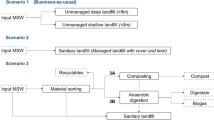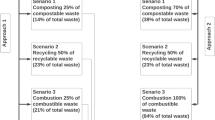Abstract
As achieving Brazil’s National Policy on Solid Waste-based goals effectively is not simple, there are alternatives such as intermunicipal cooperation by consortium or privatization. Therefore, this study aimed to evaluate the Greenhouse Gas emissions and energy use of six scenarios in two landfills contexts (private and consortium) for small municipalities (less than 100,000 inhabitants as per Brazilian standards) located in São Paulo, Brazil. Through the technique of scenario building and method of Waste Reduction Model was possible to obtain the total energy, the amount of carbon dioxide equivalent (CO2E) and carbon equivalent (CE) emissions. The best scenario integrates composting and recycling, reducing 72 % for CO2E and CE emissions, and saving about 410 % in energy. The landfill consortium will only take advantage, if the location is the most ideal as far as possible. Small municipalities that do not dispose their waste in landfills compatible with regulatory standards may seek for intermunicipal cooperation and adopt integrated waste-management programmes to reduce their environmental impacts.
Similar content being viewed by others
References
Abduli MA, Naghib A, Yonesi M, Akbari A (2011) Life cycle assessment (LCA) of solid waste management strategies in Tehran: landfill and composting plus landfill. Environ Monit Assess 178:487–498. doi:10.1007/s10661-010-1707-x
Adhikari BK, Barrington S, Martinez J (2006) Predicted growth of world urban food waste and methane production. Waste Manag Res 24:421–433. doi:10.1177/0734242X06067767
Alm J (2015) Financing urban infrastructure: knowns, unknowns, and a way forward. J Econ Surv 29:230–262. doi:10.1111/joes.12045
Antonopoulos I-S, Karagiannidis A, Tsatsarelis T, Perkoulidis G (2013) Applying waste management scenarios in the Peloponnese Region in Greece: a critical analysis in the frame of life cycle assessment. Environ Sci Pollut Res Int 20:2499–2511. doi:10.1007/s11356-012-1139-y
Aprilia A, Tezuka T (2013) GHG emissions estimation from household solid waste management in Jakarta, Indonesia. J Energy Power Eng 7:661–668
Aprilia A, Tezuka T, Spaargaren G (2012) Household solid waste management in Jakarta, Indonesia: a socio-economic evaluation. In: Marmolejo Rebellon LF (eds) Waste management—an integrated vision. InTech. Available from http://www.intechopen.com/books/waste-management-an-integrated-vision/household-solid-wastemanagement-in-jakarta-indonesia-a-socio-economic-evaluation
Aye L, Widjaya ER (2006) Environmental and economic analyses of waste disposal options for traditional markets in Indonesia. Waste Manag 26:1180–1191. doi:10.1016/j.wasman.2005.09.010
Barros RM, Filho GLT, Moura JS et al (2013) Design and implementation study of a permanent selective collection program (PSCP) on a University campus in Brazil. Resour Conserv Recycl 80:97–106. doi:10.1016/j.resconrec.2013.09.005
Barros RM, Tiago Filho GL, Silva TR (2014) The electric energy potential of landfill biogas in Brazil. Energy Policy 65:150–164. doi:10.1016/j.enpol.2013.10.028
Bradfield R, Wright G, Burt G et al (2005) The origins and evolution of scenario techniques in long range business planning. Futures 37:795–812. doi:10.1016/j.futures.2005.01.003
Brasil (2008) Plano Nacional sobre Mudança do Clima: PNMC Brasil. Comitê Interministerial sobre Mudança do Clima, Brasília
Brasil (2009) Lei no 12.187, de 29 de dezembro de 2009: Institui a Política Nacional sobre Mudança do Clima - PNMC e dá outras providências, Brasil
Brasil (2010) Lei no 12.305, de 02 de agosto de 2010: Institui a Política Nacional de Resíduos Sólidos; altera a Lei no 9.605, de 12 de fevereiro de 1998; e dá outras providências. Brasília, Brasil
Buarque SC (2003) Metodologia e técnicas de construção de cenários. IPEA, Brasília
CETESB (2013) Inventário estadual de resíduos sólidos domiciliares 2012. CETESB, São Paulo
Chang N-B, Pires A, Martinho G (2011) Empowering systems analysis for solid waste management: challenges, trends, and perspectives. Crit Rev Environ Sci Technol 41:1449–1530. doi:10.1080/10643381003608326
Chapman L (2007) Transport and climate change: a review. J Transp Geogr 15:354–367. doi:10.1016/j.jtrangeo.2006.11.008
Cornelius P, Van de Putte A, Romani M (2005) Three decades of scenario planning in shell. Calif Manag Rev 48:92–109
Corrêa HL, Corrêa CA (2009) Administração de produção e operações: manufatura e serviços: uma abordagem estratégica. Atlas, São Paulo
Environmental Protection Agency (2006) User’s Guide for WARM. In: User’s Guide. WARM. http://epa.gov/epawaste/conserve/tools/warm/Warm_UsersGuide.html. Accessed 13 April 2014
Fujii M, Fujita T, Ohnishi S et al (2014) Regional and temporal simulation of a smart recycling system for municipal organic solid wastes. J Clean Prod 78:208–215. doi:10.1016/j.jclepro.2014.04.066
Gentil EC, Gallo D, Christensen TH (2011) Environmental evaluation of municipal waste prevention. Waste Manag 31:2371–2379. doi:10.1016/j.wasman.2011.07.030
Greene KL, Tonjes DJ (2014) Quantitative assessments of municipal waste management systems: using different indicators to compare and rank programs in New York State. Waste Manag 34:825–836. doi:10.1016/j.wasman.2013.12.020
Guerrero LA, Maas G, Hogland W (2013) Solid waste management challenges for cities in developing countries. Waste Manag 33:220–232. doi:10.1016/j.wasman.2012.09.008
Herva M, Neto B, Roca E (2014) Environmental assessment of the integrated municipal solid waste management system in Porto (Portugal). J Clean Prod 70:183–193. doi:10.1016/j.jclepro.2014.02.007
Hoornweg D, Bhada-Tata P, Kennedy C (2013) Environment: waste production must peak this century. Nature 502:615–617. doi:10.1038/502615a
IBGE (2010) Informações sobre os municípios brasileiros. In: Informações sobre os municípios Bras. http://cidades.ibge.gov.br/xtras/home.php. Accessed 13 April 2014
Instituto de Pesquisa Econômica Aplicada (2012) Diagnóstico dos Resíduos Sólidos Urbanos. IPEA, Brasília
IPCC (2014a) Climate change 2014: mitigation of climate change. Contribution of working group III to the 5th assessment report of the intergovernmental panel on climate change. Cambridge, United Kingdom and New York, NY, USA
IPCC (2014b) Climate change 2014: impacts, adaptation, and vulnerability. Part A: global and sectoral aspects. contribution of working group II to the 5th assessment report of the intergovernmental panel on climate change. Cambridge University Press, Cambridge
IPCC (2014c) Climate change 2014: impacts, adaptation, and vulnerability. Part B: regional aspects. Contribution of working group II to the 5th assessment report of the intergovernmental panel on climate change. Cambridge University Press, Cambridge
Jabbour ABLS, Jabbour CJC, Sarkis J, Govindan K (2014) Brazil’s new national policy on solid waste: challenges and opportunities. Clean Technol Environ Policy 16:7–9. doi:10.1007/s10098-013-0600-z
Koushki PA, Al-Duaij U, Al-Ghimlas W (2004) Collection and transportation cost of household solid waste in Kuwait. Waste Manag 24:957–964
Lai K, Li L, Mutti S, et al (2014) Evaluation of waste reduction and diversion as alternatives to landfill disposal. In: 2014 Systems and information engineering design symposium (SIEDS). IEEE, pp 183–187
Larsen AW, Vrgoc M, Christensen TH, Lieberknecht P (2009) Diesel consumption in waste collection and transport and its environmental significance. Waste Manag Res 27:652–659. doi:10.1177/0734242X08097636
Lindgren M, Bandhold H (2003) Scenario planning: the link between future and strategy. Polgrave Macmillan, New York
Lou XF, Nair J (2009) The impact of landfilling and composting on greenhouse gas emissions: a review. Bioresour Technol 100:3792–3798. doi:10.1016/j.biortech.2008.12.006
Mahmoudkhani R, Valizadeh B, Khastoo H (2014) Greenhouse Gases Life Cycle Assessment (GHGLCA) as a decision support tool for municipal solid waste management in Iran. J Environ Health Sci Eng 12:1–7. doi:10.1186/2052-336X-12-71
Massukado LM, Milanez B, Luedemann G, Hargrave J (2013) Diagnóstico da Gestão de Resíduos Sólidos Urbanos no Brasil: uma análise pós PNSB 2008—ênfase na destinação final e nos resíduos orgânicos. Rev DAE 22–33
Matos F, Dias R (2011) A gestão de resíduos sólidos e a formaçao de consórcios intermunicipais. Rev em Agronegócios e Meio Ambient 4:501–519
Melo LA, Sautter KD, Janissek PR (2009) Estudo de cenários para o gerenciamento dos resíduos sólidos urbanos de Curitiba. Eng Sanit e Ambient 14:551–558. doi:10.1590/S1413-41522009000400015
Menikpura SNM, Sang-Arun J, Bengtsson M (2013) Integrated solid waste management: an approach for enhancing climate co-benefits through resource recovery. J Clean Prod 58:34–42. doi:10.1016/j.jclepro.2013.03.012
Ministério do Meio Ambiente (2012) Plano nacional de resíduos sólidos. MMA, Brasília
Morrissey AJ, Browne J (2004) Waste management models and their application to sustainable waste management. Waste Manag 24:297–308. doi:10.1016/j.wasman.2003.09.005
Nobre CA, Lapola D, Sampaio G et al (2007) Relatório No. 6. Mudanças Climáticas e possíveis alterações nos Biomas da América do Sul. Ministério da Saúde, São Paulo
Pires A, Martinho G, Chang N-B (2011) Solid waste management in European countries: a review of systems analysis techniques. J Environ Manag 92:1033–1050. doi:10.1016/j.jenvman.2010.11.024
Premakumara DGJ, Canete AML, Nagaishi M, Kurniawan TA (2014) Policy implementation of the Republic Act (RA) No. 9003 in the Philippines: a case study of Cebu City. Waste Manag 34:971–979. doi:10.1016/j.wasman.2013.10.040
Santos MFN, Battistelle RAG, Bezerra BS, Varum HSA (2014) Comparative study of the life cycle assessment of particleboards made of residues from sugarcane bagasse (Saccharum spp.) and pine wood shavings (Pinus elliottii). J Clean Prod 64:345–355. doi:10.1016/j.jclepro.2013.06.039
Secretaria do Meio Ambiente (2014a) Plano de Resíduos Sólidos do Estado de São Paulo, 1st edn. SMA, São Paulo
Secretaria do Meio Ambiente (2014b) Município VerdeAzul. http://www.ambiente.sp.gov.br/municipioverdeazul/. Accessed 17 Jan 2015
Sethi S, Kothiyal NC, Nema AK (2013) Stabilisation of municipal solid waste in bioreactor landfills: an overview. Int J Environ Pollut 51:57–78. doi:10.1504/IJEP.2013.053175
Song Q, Wang Z, Li J (2013) Environmental performance of municipal solid waste strategies based on LCA method: a case study of Macau. J Clean Prod 57:92–100. doi:10.1016/j.jclepro.2013.04.042
Taheri M, Gholamalifard M, Ghazizade MJ, Rahimoghli S (2014) Environmental impact assessment of municipal solid waste disposal site in Tabriz, Iran using rapid impact assessment matrix. Impact Assess Project Apprais 32:162–169. doi:10.1080/14615517.2014.896082
Tan ST, Hashim H, Lim JS et al (2014) Energy and emissions benefits of renewable energy derived from municipal solid waste: analysis of a low carbon scenario in Malaysia. Appl Energy 136:797–804. doi:10.1016/j.apenergy.2014.06.003
Tchobanoglous G, Kreith F (2002) Handbook of solid waste management, 2nd edn. McGraw Hill, New York
Vergara SE, Damgaard A, Horvath A (2011) Boundaries matter: greenhouse gas emission reductions from alternative waste treatment strategies for California’s municipal solid waste. Resour Conserv Recycl 57:87–97. doi:10.1016/j.resconrec.2011.09.011
Worrell W, Vesilind P (2011) Solid waste engineering, 2nd edn. Cengage Learning, Stamford
Yang N, Damgaard A, Lü F et al (2014) Environmental impact assessment on the construction and operation of municipal solid waste sanitary landfills in developing countries: China case study. Waste Manag 34:929–937. doi:10.1016/j.wasman.2014.02.017
Zaman AU (2013) Identification of waste management development drivers and potential emerging waste treatment technologies. Int J Environ Sci Technol 10:455–464
Zaman AU (2014) Measuring waste management performance using the “Zero Waste Index”: the case of Adelaide, Australia. J Clean Prod 66:407–419. doi:10.1016/j.jclepro.2013.10.032
Author information
Authors and Affiliations
Corresponding author
Rights and permissions
About this article
Cite this article
Deus, R.M., Battistelle, R.A.G. & Silva, G.H.R. Scenario evaluation for the management of household solid waste in small Brazilian municipalities. Clean Techn Environ Policy 19, 205–214 (2017). https://doi.org/10.1007/s10098-016-1205-0
Received:
Accepted:
Published:
Issue Date:
DOI: https://doi.org/10.1007/s10098-016-1205-0








